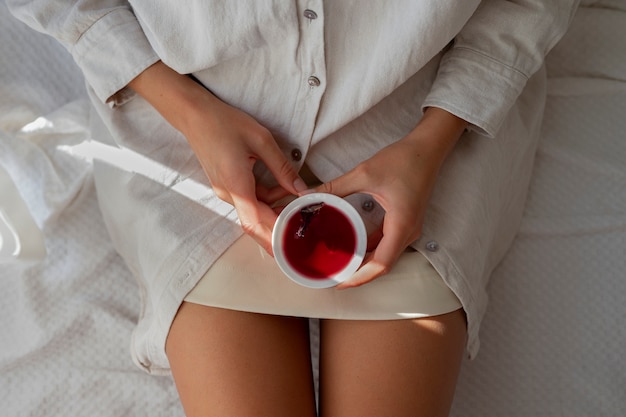
Vaginal itching is a bothersome irritation or tingling that can affect the vagina and surrounding areas, such as the vulva. This heightened sensitivity often leaves women feeling uncomfortable and may trigger a persistent urge to scratch.
### Common Causes of Vaginal Itching and Irritation
In most cases, vaginal itching and irritation are harmless. However, if the symptoms persist or worsen, they could be linked to underlying causes that need medical attention. Some common causes include:
– **Stress:** Stress can weaken the immune system, making infections more likely.
– **Hormonal Changes:** Menopause can cause vaginal dryness due to reduced hormone levels.
– **Allergies and Irritants:** Certain fabrics, soaps, detergents, or other chemicals can irritate sensitive skin in the area.
– **Yeast Infections:** Yeast vaginitis, caused by the fungus *Candida albicans*, is a common issue. It can develop due to pregnancy, antibiotics, birth control, diabetes, weakened immunity, or sexual activity. This infection often produces a thick white discharge along with itching.
– **Abrasion or Friction:** Inserting foreign objects without proper lubrication, wearing tight clothing, biking, or horse riding can lead to irritation.
– **Vaginitis:** This infection, particularly in young girls before puberty, can stem from poor hygiene or inappropriate exposure. If sexually transmitted in minors, it’s crucial to address potential abuse immediately.
– **Precancerous Conditions:** Though rare, persistent itching could signal a precancerous or cancerous skin condition.
### Symptoms to Watch Out For
Vaginal itching is quite common, and most women experience it at some point. Depending on the cause, other symptoms might include pain, redness, swelling, unusual discharge, or bleeding in the vaginal and vulvar areas.
### Home Remedies for Vaginal Itching
There are several steps you can take at home to ease symptoms and prevent future irritation:
– Wear cotton underwear as it allows the skin to breathe. Avoid synthetic fabrics that can trap moisture and irritation.
– Always wear clean, dry underwear; wet or soiled garments encourage infections.
– Practice safe sex by using condoms to prevent sexually transmitted infections.
– Use vaginal moisturizers to combat dryness.
– Avoid excessive washing or douching, as they can disrupt the natural balance of healthy bacteria.
– Stay away from scented soaps, bubble baths, or other products that could irritate sensitive skin.
– Practice good hygiene, such as wiping front to back after using the restroom.
– Follow a healthy diet to strengthen your immune system. Foods rich in probiotics, such as yogurt containing *Lactobacillus acidophilus*, can help prevent infections.
– Phytoestrogens in foods like tofu, flaxseed, and soy may reduce vaginal dryness.
– If you have diabetes, keep your blood sugar levels under control since high levels can increase sensitivity.
– Educate young girls about proper hygiene to prevent infections.
**Additional Tips:**
– Avoid sexual activity until symptoms improve.
– Minimize physical activities that may exacerbate irritation, such as extended periods of intense exercise or exposure to heat and sweat.
– Refrain from scratching the area since it can worsen the condition.
### Natural and Herbal Remedies
Certain natural remedies may provide relief from vaginal itching and irritation. Suggestions include:
– **Lycopodium:** A homeopathic remedy known to relieve yeast infections and itching.
– **Sepia:** Often used for menopausal women experiencing dryness, itching, or discharge.
– **Coconut or Olive Oil:** These oils can soothe dryness and irritation when applied gently.
– **Garlic:** Known for its anti-fungal properties, consuming raw garlic or drinks made with crushed garlic may help counter fungal infections.
– **Calendula Ointments:** These have healing properties that rejuvenate irritated tissues.
– **Cold Compress:** Applying a cool cloth to the area can ease irritation and discourage scratching.
– **Buttermilk:** When applied topically, it can help relieve itching and discomfort.
– **Apple Cider Vinegar and Yogurt:** A mixture of these applied with a washcloth can soothe the affected area.
– **Herbal Extracts:** Slippery elm and grapefruit seed extracts may help reduce irritation.
### When to See a Doctor
Although mild vaginal itching can often be managed at home, you should consult a doctor if you notice:
– Fever or lower abdominal pain alongside itching.
– Possible symptoms of diabetes, such as sudden weight loss, extreme thirst, or frequent urination.
– Lesions, ulcers, or unusual swelling in the vaginal or vulvar area.
– Symptoms of a urinary tract infection, like burning or discomfort during urination.
– Unusual vaginal discharge, bleeding, or swelling.
– Potential signs of a sexually transmitted infection, especially if your partner is also symptomatic.
– Recurring or long-lasting symptoms despite self-care efforts.
### What to Expect During a Medical Visit
Your doctor may perform a pelvic exam and ask questions to identify the cause of your symptoms. Depending on the findings, diagnostic tests such as a pap smear, blood and urine tests, vaginal discharge culture, or skin biopsy may be necessary.
Based on the diagnosis, treatment options may include:
– Hormone-based medications to address dryness or sensitivity.
– Steroid creams to relieve itching and irritation.
– Antibiotics or antifungal medications to treat infections, including sexually transmitted diseases or yeast infections.